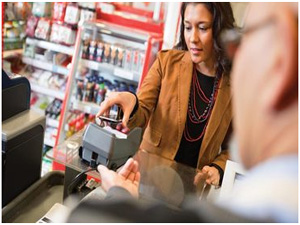



Date:20/04/12
 Smartphones with "paytags" will make both cash and credit cards redundant by 2020, according to a survey of 1,200 technology experts polled for a report by Pew Internet Research.
Smartphones with "paytags" will make both cash and credit cards redundant by 2020, according to a survey of 1,200 technology experts polled for a report by Pew Internet Research.
However, cash and card will nevertheless survive for "some types of consumers and because of security concerns and a desire for anonymity," the ‘The Future of Money in a Mobile Age' report added.
The report comes in the year that mobile payments are expected to take-off in the UK, with a number of organisations committed to rolling out the necessary infrastructure in retail outlets. Meanwhile, mobile phone suppliers and operators have committed to incorporating the technology in new mobile phones for sale in the UK market.
Respondents, such as Microsoft distinguished engineer Christian Huitema, believe that the conceptual leap was already made when society accepted debit and credit card payments.
"We have already witnessed the transition from cash to debit/credit cards. The electronic wallet is not much more than a ‘virtual card' in which near-field wireless communication [NFC] replaces the reading of a magnetic stripe," said Hiutema.
The biggest barrier to widespread adoption, according to Pew's experts, is the rollout of the infrastructure rather than people's willingness to use it. In Japan, for example, such technology has been in use for the past four years. But the cost of rolling it out may hamper adoption in the US and elsewehere.
"I don't think it will be security concerns that will stall the adoption of NFC so much as the effort involved with getting the infrastructure for its use in place on a national scale in the US," said University of Illinois-Chicago professor Steve Jones.
Internet architect and "activist" Bill St. Arnaud believes that NFC will take-off in developing markets first – in the same way that mobile took off in many third-world countries before their fixed-line telephone systems were developed – because of a lack of alternative payments infrastructure.
Smartphones to make cash and card redundant by 2020 - report
 Smartphones with "paytags" will make both cash and credit cards redundant by 2020, according to a survey of 1,200 technology experts polled for a report by Pew Internet Research.
Smartphones with "paytags" will make both cash and credit cards redundant by 2020, according to a survey of 1,200 technology experts polled for a report by Pew Internet Research.However, cash and card will nevertheless survive for "some types of consumers and because of security concerns and a desire for anonymity," the ‘The Future of Money in a Mobile Age' report added.
The report comes in the year that mobile payments are expected to take-off in the UK, with a number of organisations committed to rolling out the necessary infrastructure in retail outlets. Meanwhile, mobile phone suppliers and operators have committed to incorporating the technology in new mobile phones for sale in the UK market.
Respondents, such as Microsoft distinguished engineer Christian Huitema, believe that the conceptual leap was already made when society accepted debit and credit card payments.
"We have already witnessed the transition from cash to debit/credit cards. The electronic wallet is not much more than a ‘virtual card' in which near-field wireless communication [NFC] replaces the reading of a magnetic stripe," said Hiutema.
The biggest barrier to widespread adoption, according to Pew's experts, is the rollout of the infrastructure rather than people's willingness to use it. In Japan, for example, such technology has been in use for the past four years. But the cost of rolling it out may hamper adoption in the US and elsewehere.
"I don't think it will be security concerns that will stall the adoption of NFC so much as the effort involved with getting the infrastructure for its use in place on a national scale in the US," said University of Illinois-Chicago professor Steve Jones.
Internet architect and "activist" Bill St. Arnaud believes that NFC will take-off in developing markets first – in the same way that mobile took off in many third-world countries before their fixed-line telephone systems were developed – because of a lack of alternative payments infrastructure.
Views: 1254
©ictnews.az. All rights reserved.Similar news
- Mobile operators of national market to reduce roaming tariffs
- Iran vows to unplug Internet
- China Targeting Telecoms in Corruption Probe
- Bangladesh to use electronic voting system for next elections
- Philippine IT sector to launch five-year digital strategy plan
- Russian Premier Vladimir Putin meets ITU Secretary-General Hamadoun Touré
- US lawmakers propose to regulate use of geolocation data
- Unlimited mobile data plans dying as telcos gear up for cloud future
- Europe at risk of falling behind US and Asia on 4G use
- Netherlands first to regulate on net neutrality
- Korean Co Takes Aim At Display Patents
- Regulators, Banks Look for IT Hires After Breakdowns
- Electron transactions spreading
- Schools in remote rural areas will connect to the single database via network without SIM
- Obama to Personally Tweet From Twitter Account





















